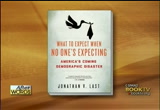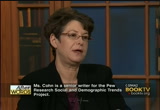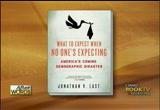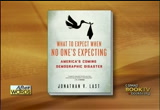tv Book TV After Words CSPAN February 10, 2013 12:00pm-1:00pm EST
12:00 pm
which this generation will be judged and is critical that we address it. i think there are some prospects. maybe we should call it something other than climate change in order to get the consensus we need. but it has to be addressed. >> we're out of time. if you wouldn't mind thinking the senator. [applause]
12:01 pm
>> jonathan, welcome. this is a very meaty book. there's a lot going on in here. the main thesis is falling birthrate re: problem and what are the causes of those birthrates and the consequences? along the way touch on many topics including the changing role of the women, sustainability and social welfare programs, religion and population aging. we'll get to all of those during the next hour. but first, why don't you answer for me the question that ever reporters asked by his or her editor and reporter purchase of purchased with a story idea. why does this matter? why is it important? >> and matters because fertility rates and demographics or what my friend phil long in town here at the new america foundation says it's like the tectonic plates shifting beneath the
12:02 pm
earth. demography isn't quite dead to me, but it's close. .. are we talking about a year, a few years, a decade, centuries, where is it happening? >> host: so the phenomena has begun in the west, it began around 1970. to back up quickly. the way we measure this is by simple birth statistics. it's not terribly difficult to
12:03 pm
do. when you have well organized societies to keep track of them you know how many people are born and their ages and their parent's ages. they calculate the birthrate, the general fertility rate and a total fertility rate. it's not a real number, in the sense that it's a hard and fast number. it's a statistical construct which means, basically, right now this very moment in time if every woman were to live to the end of her life having an average of number of children. what would the number be? america right now, for instance, that number is 1.93. the golden number for us, the golden number in all demographics is 2.1. it's the replacement rate. in order for society to maintain the population. the average woman has two have 2.1 children over the course of her lifetime. if they have more than that.
12:04 pm
the society's population grows. if she has fewer then over time the population contracts and dismirning. -- diminishing. >> to some extend the process has been going on for centuries. the fact that birthrates have been going down. >> right. you could see in america the first good data it comes in 1800. from almost the founding you are able to see the fertility rates declining. by the time we hit the second world war we were around the replacement rate of 2.1. 2.2. immediately after the second world war we had the only major increase in fertility rate. that was the only one in history, that's the baby boom. that's the term that hit us, everybody knows about it. it was a remarkingble moment, not only did it increase quite, it went as high as 3.7, i think, for white americans and 3.9 for
12:05 pm
black americans. not only did it jump up, it stayed up for an entire generation. it was a long lasting effect. people changed the way they live farred generation. by 1970, that momentum, that moment ended and we saw not a gradual float down but the fertility rate dropping off a cliff. when it happened, it happened everywhere in the west. japan, canada, happened in germany, want united nations and france and america. it continuered to -- continued to slide. what's interesting since the west has demographers have called the fertility decline, you see the other countries begin to follow. 97 percent of the population lives in a country where the fertility rate is declining. south america, europe, and asia. what is striking and what people don't pay attention to. in many part of the world the actual taber tillty rate -- fertility rate is higher. the rate of decline is general
12:06 pm
steeper. if you look down in mexico and central america and south america. many of the countries have fertility rates slightly above what we have. the overall rate of decline is steeper. when you look at the numbers you can't just look at the numbers today. you have to look at the trend and d x dt and watch the slope of the curve. >> host: are there certain groups here in the united states or in other countries who having more babies than groups or converse ily or groups where the fertility rate is more apparent. >> guest: there are just to take america for a moment. we talk about that. the fertility rates are never constant across populations. the 1.93 here in america is the average. we break that up by different demographic groups you get different numbers. the white americans along the ethnic groups have the lowest
12:07 pm
1.6 and african-americans have a healthy fertility rate of 2.0 and hispanic americans have a higher rate. the only reason the for fillty rate isn't lower because the hispanic americans are having all the babies that no one else will have right now. it's a problem. it's a problem for america. we are so dependent on the fertility of hispanic americans. you have to look at the slope of the curve. the fertility rates for the hispanic americans is increed belie steep. the center released a survey a few months ago showing over the last three years between 2007 and 2010, mexican-born americans saw a decrees of 23%. that's an astonishing return to the mean. looking at not just where we're now, where we are going in the near future, what the suggested all of these groups are following white americans or
12:08 pm
middle class americans back down toward a lower fertility number. >> host: we'll take up the issue of immigration later. what's some people have proposed as a solution for the fertility. let's talk about the larger population processes. they are lead together declining births. certainly we know what is happening recenting. going back in time a couple -- a century or two. talk a little bit about the larger forces at work. for example, many demographers say that one reason birthrates began going down because there were fewer infant death and there were improvements in the fight against infant death. and it helped parents be able to have smaller families. >> one of the things i say in my book, what you're seeing isn't a conspiracy. it's not if there are secret forces trying to lower fertility. what it is the net effect of a giant constellation that have
12:09 pm
nudged us in the single distribution to have fewer babies. some of the forces are pernicious. the -- but some of them are wonderful. and one of them is what you mentioned. the decline in infant mortality. the infant mortality numbers were astonishly high. it was gruesome to have a baby then. it slunk to what it is today. -- a wonderful development who isn't for that? it enable people to have fewer children and able to get more children to survive to adult age. we have other forces like urbanization. we are more urban now than 200 years ago. when you look back at the numberings -- number in the research you can see the effect of urbanization on the fertility rates even as far back as -- in
12:10 pm
rural new york higher fertility rates than soon to become new york city. as you have a more urban country, a less rural country. children survive at the higher rate, you're naturally getting people to have fewer babies. again, these are good effects. that's one of the things i try to mention in the book is that, you know, to preserve the overall effect on this creates problems. not every one of the causes is a problem. some are wonderful things. and even wonderful things can, you know, have ill and adverse effects. >> well, why would urbanization lower fertility? >> guest: well, lots of reasons. one which is simple cost. when you urbanize, everything costs more. the higher your population density, the higher your costs of living. higher land costs, higher child care costs, higher education costs, and not just that.
12:11 pm
as we look back historically and we move from, you know, to an industrial society. in a society children are free work. right. you have seven kids and workingen a a family farm by the time the kids are 10 years old. those are helping hands. when you live in the city and working in factory and doing mechanized work. the children are not a help. they are simply a cost. this is one of the factors pushing us in the direction. and another big change is the nature of the welfare state. you know, something which exists in 19th century america. we were on our own. as we got older the children took care of you. that's reason of the reasons you have kids. you hope you have at least one good one. and now we don't need to have that anymore. we have social security, we have medicare, it's nice to have a child to love you and look after
12:12 pm
you as you begin to drool and watch more tv. it's no longer necessary. and these all of these little things, these, you know, these tiny changers, some bigger some smaller have pushed us in direction of having fewer children. >> host: back to the issue of costing children. you talk about the increasing price of a child so much as $1,000 strollers for parents who want to get in it as well as the figures on the government supply of the cost of raising a child. could you talk about that a little bit and how that might be effecting people's decisions? >> guest: this is a family show. i don't know if we can mention the numbers. it's striking. again, it's not just the thousand dollar strollers and not just the $14 00 cribs. i found a $50,000 backyard play set. it was one of the most amazing things. michael bloomberg doesn't even need that.
12:13 pm
so if the government has kept track of costs of having children since 1950. what they have found is that the cost has increased in real dollars in constant dollars not with just inflation an enormous decree. and today if you count college tuition in the foregone wages of a parent, which is not somebody staying home full time for twenty two years, if so you a baby and you take off for the first six years, until the child is in school full-time and you return to work, you know, the part-time or full-time work, the average cost is going to be about $1.1 million for a child. that's a staggering amount of money to spend on, you know, somebody which with they're 16 is going to say they hate you. and it's not just that, i mean, you put that in perspective, you see the average cost of the home and, you know, i think the median cost of the house of a $200,000. it's like buying five houses all
12:14 pm
at once but you can't sell it. and you can see people are not -- people aren't crazy. there's a reason. if you're not even buying the $50,000 backyard play set and taking hand me down clothes and strollers, it costs a lot of money to have a child in america. >> host: you mentioned in your book, car seats. and the complications of finding a right one, installing it and so forth. where does it fit? >> guest: the car seats are a fascinating tributary of this. i said there's a gientd consolation of forces. one of them, it's a very tiny force, so tinny we couldn't measure it. car seats, you and i did not ride in car seats. most certainly. i don't want to gets. if you were a child before the '70s you almost never road in the car seat. you sad sat if your mother or father's arms or rolled around
12:15 pm
in the backseat. you were fine. we made it. we're here today. everything is fine. in the 1970s a couple of people in tennessee, a physician and a legislator got together and they got in their head that it was unsafe for children to be carted around in cars in the matter. they worked hard to pass a law requiring car seats. this is good. we like car seats. it turns out they are safer than rolling around in the backseat when you are 2 years old. they saved a lot of lives about 7,000 since the '70s. but they impose a small cost. because you can't fit a three car seat in the back of a normal mid-sized se zone. if you have to have a larger family, today three children counts as a larger family. you need to spend more money and get a bigger car. it's a big tax but it's a small tax. the car seat is objectively prochild and antifamily. >> host: what about some of the other social forces that are
12:16 pm
leading in the direction? for example, working women, women going to college, all of those seem to be pushing us toward a world of which having a child is -- could be more difficult at least for some. >> guest: the problem you run against biology; right. anything that pushes the average age of first birthday back ward is going to push you to have fewer children. 7 the average age of having the first child is 28 years old. it used to be 22. we made college virtually required for middle class life. for everybody. both men and women. and as you push back that age of first family formation, so people can't think about getting married until they are out of college to 22 an age people used to be well married and settled and ready to begin family life. these are pushing the horizon you might be having children further back. and this then -- unless you want
12:17 pm
to have a lot of kids close together. only crazy people like my wife and i have done, it becomes a lot harder and people wind up having fewer children. one of the things you see in america is, people have on average fewer children than they wish they did. our average ideal fertility number in america, most people say is perfect, is 2.5. again our actual fertility achieved fertility is almost a whole half of a kid less than that. you see modern life conspired and say it's not responsible to have a kid before you're married and settled and have the first real place. it's not responsible to get married and have a good job until you -- they back up and you're not beginning family life until many times your 30 or 32 years old. >> well, we're seeing with marriage the median age for men and women in the late 20s. unless you're going to have a
12:18 pm
child without being married. that's pushing off childbirth. >> guest: right. it pushes it backwards. it's interesting how a lot of -- so. stuff becomes counter intuitive. a lot of people might assume as women have been pushed to the workplace in greater numbers we're 70% of women in h work outside the home. that would contribute to fertility decline. and maybe it does. maybe it doesn't. the data on this is ambiguous. there's research done in europe that shows countries with higher participation rates in a limited work force like france, sweden, and norway have higher fertility rates than traditional gender role countries like greece and italy and spain. women work in lower rate. in all of these, i try to come back to this often in the book, you should always look to the data. the data will tell you things that you might not would think would be true. >> host: i think some of the thinking behind some demographers feel like countries
12:19 pm
like france and ones where the nordic countries where maybe make it easier for women to work. they are more inclined to think they can mix having a career and children. do you think it might be the case? >> guest: it's tough to say. that's a good deal of research on this. there's a great fantastic bit of research done on the net effect of the state spend. state spending, for the most part, means places like the nordic countries like government-run daycare center. your taxes pay for the government to create the daycare center and you drop your kids off to go to work to pay your taxes. it's a circular sounding system. the actual effect of this are pretty small on fertility. for the every 25% increase in government spending you get about 0.6% increase. what's the difference between france and the nordic countries and countries we see in southern
12:20 pm
europe the fertility rates are lower around 1. 3. or 1.5. the difference is cultural. there's places where a a long standing commitment to try to make family life work. in france and nordic country have been obsess with the demographic stuff since around the world war. it helps for a country to take it seriously over the long haul if they extend the tide. >> host: i want to come back later to the things that countries trying and what works and what doesn't, if any. let's back up and talk about causes and the whys of what role does religion play? it seems to be an important predictor in some sense. who is going to have children and not. not religion in the sense of belief, but in terms of attendance at church services or other participation in religious life. could you talk about that a little bit? >> guest: it's a fascinating
12:21 pm
subject, actually, it has changed. if you go back and look at the national vital statistics report from the 1900s the early 1900s you see classifications and the demographers were obsessed about the split between catholic and protestant. there was a huge demographic split. over the years, catholic fertility less end and protestant continued. and a lot thought it was the end of catholic fertility. they were no longer special. it no longer matter what your twhawl belief if. as a matter of fact if you were jewish or muslim or mormon, or catholic or property protestant all that mattered is a how you attended the services. there was a straight line between fertility and church attendance. and if you go once every two months, the fertility is higher
12:22 pm
than if you go not at all. if you go once a month it's higher. if you go once a week, it's higher still. not only is the fertility higher but the ideal fertility people who go to church once a week want to have bigger families than people who do not. and so you have the real split in america now between secular america, where not only are the fertility rates much lower, ideal fertility rates lower, and believing in america, religious america. people want bigger families but have bigger families. if you think about it abet dote -- ante-dotely. what is the last time you saw a family with six or seven kids that didn't go to church every week. there aren't many. a giant survey about 1700 families. you look at the number of people who had four or more children and look at them by church attendance and the number of people with four or more children who never go to church is exactly zero.
12:23 pm
>> host: wow. church play an important role in reinforcing family dynamic and encouraging a community of people who have children and perhaps that helps encourage families to have more of them. >> guest: i think so. and a number of -- three quarter thoughts about this in the book. again, to a lot of extent, having a kid is a raw deal. it's not a lot of fun. there's a ton of research having the study. which suggests that when you have a -- take any two people are identical by every way. same grace, same religion, same income. one is a parent, one not a parent. parent is going to be about 6 percentage points less happy than the nonparticipant. -- parent. it makes sense having a kid is not a barrel of laughs. it's a lot of hard work. it's difficult -- we'll talk about it later. it's difficult for governments
12:24 pm
to bribe people to have a children. you can't construct a bribe big enough of to for the i hate you, diapers and money. you can argue having children. i think it's largely what churches do. they continue argue that you should have specifically. religions do. some churches do is suggest there is something bigger than you and i right at this moment. and that is really the prerequisite to you love your wife as you know it and have a child now. you believe there's something bigger an more important than what you're doing right now. it's okay to give your own happiness. you are doing it in service of something bigger. >> host: let me raise an issue that could be a little delicate. there have been some commentators who have talked about falling fertility and framed it in terms of wrong people having children or the
12:25 pm
right people not having enough of them. what are you thoughts on? could you talk about how the issue is played out? >> guest: it's hard to look at any part of the history of demographic and not see any of this. we refer to delicately to the eugenic movement. and it expands through margaret sanger a member of planned parenthood and figure on the left who has terribly -- in fact she con received the birth control pill specifically as a means to have fewer children from the unfit, as she put it. when she talk about the input, -- unfit she talk about the people in the jungle. it's gross stuff. one of the happy thing about the fertility collapse is since everybody is having fewer children. it's hard to look and say, these
12:26 pm
people are having too many. nobody is having enough children anymore as it is. but yeah, there's a threat an undercurrent of demography about, you know, the undesirable having too many children. you sigh in in a nonracist way but slightly ugly. there was a movie that came out and the thesis of the book is smart people aren't having enough children and the dumb people are outbreeding us. in the future the world is run by idiots. it's a funny premise in some way. the movie itself is funny. but it's wrong because all the people that the movie looks down on as our dumb people having too many children, they're not having too many children. in fact they have cut back on the fertility as well. and a demographer did a really interesting study about five years ago looking at the course
12:27 pm
of 700 years, 900 population data and what he found is fertility as always been aspirational behavior. some of the people wanted to do an emlation of what they thought was success. for several centuries the elite many more children and the lower classes had fewer children only because they could not achieve the level of aleet. they couldn't afford as many children. when the elite began cutting back on having children, poor people, the lower classes they followed their lead and the two groups have been headed on the same slope and downward headed path for replacement every since then. >> host: you probably have read in brazil the country's fertility rate. one of the reasons that cited is that all of the soap opera on television show well off, elite women with either no children or
12:28 pm
maul small families. it permeated the culture and made other women want to have smaller families. >> guest: the research in brazil is fascinated. they tracked it as television came to the rural part of the country. so they were able to, you know, as this town got the television and started looking to it what were the fertility rates what happened over the next years? you could literally watch, you know, you could see the maps where as television came to a town, the fertility went down. television came to a next town. fertility rates went down. as i said, it's larger cultural force where it's all of these things lining up together suggested to people hey, maybe it's fine not to have kids. >> host: let me pose one example before the break, which is to what extent does the falling fertility depend on women's greater aspirations for work, for more ?rexability in their lives and to what extent
12:29 pm
should women cur, thoses a i elevations. i don't suspect you believe they should should. >> guest: well, it's complicated. right. one of the interesting things when you look at the ideal fertility numbers. men and women want the same number of children in america. it's counter intuitive. you wouldn't necessarily assume that. the ideal fertility numbers change over the course of your life. as you're younger you want fewer children as you get older, you slightly adjust upwards the number of children you wish yo u had had. if you looked at women and men as they get closer to 40 the ideal number begins to jump a lict. -- little bit the fact in america we are underachieving the ideal numbers and elite levels women who go to college and complete the college degree and women who have graduate degrees, vastly underperform their ideal fertility numbers
12:30 pm
over the course of their lifetime. ic it's hard to say it's a case of deciding they don't want the children. i think it's more of a case they are deciding they want careers. they pursue their career it turns out e reeffected the culture in the system of living that makes it difficult to do both. and i think any affect to six if and -- fix this and get it out of the sticky has to rework on removing the roadblocks and allow people who want to have children to find ways to do it. on the go? after words is available via pod cast. visit book toff.org and put pod cast on the upper lbdz side of the page. select which you want to download and listen while you
12:31 pm
travel. so jonathan last, there's something else going on besides falling birthrates. it's important and they play in to each other. which is what you might call the graying of america. and the baby boom is getting old. the catchy way it can be expressed about 10,000 people a day turning 65. what are the implication of that for falling fertility? how do they reinforce each other or interact? >> guest: the way for people to think about this and think about population profile. that's a population profile of a society which has a 2.1 fertility rate, a steady replacement rate. it looks like the -- everything is nice. when you get older people pass off to the undiscovered country and point. the population age -- in a great society getting inverted pyramid
12:32 pm
and things not terrible yet in america. if you look at japan it looks like an inverted pyramid. they are going to have more people over 85 than 14 in about ten years. it greats a lot of problems. there are almost no examples of long-term economic, you know, peace and prosper. ty in intensely societies. they begin to break down. if you look at the consumer society. the demand starts slackening for everything in health care as demands starts slackening then innovation begins to dry up. there's not as much incentive as innovation. and not only that but the age
12:33 pm
cohorts were invention entrepreneurship typical happen under 40. it cohorts smaller fewer people in the innovation stage of their lives. the neat thing about capital market. the healthy population profile a lot of capital out there willing to bag risky things it's capital belonging to young people who are saving a long time. but once you have a flat society which is very gray, these people are looking to preserve their cap capital and begin drawing it down. capital flows invert. and you have the military, you know, if once you center all the money going to support the pension system and social security, medicare for the older people, you have less money for military and self-defense. not only that fewer warm body. the pool of military-age men and women is smaller. it becomes harder to project force in the world. it's not a concern for sweden. it doesn't matter if you can't
12:34 pm
support your military. but if you're america, our reasonably concerned to be a force for good in the world, a force for enforcing stability it becomes problematic >> host: let me challenge you a little bit on that. we at pugh research don't positions. there are many demographers and social scientist who say that the kinds of issues with population ages and falling fertility are maybe a kind of problem you want to have. and that governments like the ones in u.s. we have resources could solve them. and that in fact there may be an advantage to having older people who can be persuaded to join the work force or stay in longer. maybe you can bring more women in and train younger works so they can become productive. the thinking is well, this is the what happens in a modern society. let live with it. what do you say to that? >> guest: well, we'll have to look at it regardless if you
12:35 pm
think it's a good thing or a bad thing. i would say that it depends. right. it depends how deep a whole you're inspect. if you're japan where the fertility rate is 1.3 or 1.2 and there is zero immigration. there is no horizon for them to experience robust economic growth in the future. and what is more things get worse they wind up having the state fails in the pension obligations all sort of generational warfare recently the finance minister of japan but it was time for the old people of japan to hurry up and die and so you wind up sending the the number of workers
12:36 pm
retiring that gets smaller. you have two choices. the benefits to retiring where you can take more on taxes out of the workers. now if one of our problems in fertility is that we have made it, you know, too expensive to raise children and people don't have income to do so, and in fact we have seen middle class wages being stagnant since the '70s taking more taxes puts us in a vicious cycle. they there taking more from the workers and making it harder for for them to have children. it becomes dangerous, i think, to hope that, you know, we can muddle through. we may have to. it may be the best we can do. again, also, these are first world problems. they are better than third world. it's one thing to get old as you are rich. it's quite another thing to get
12:37 pm
old as you're poor. the same thing we're seeing in america with regard to the fertility decline are happening all over the world. when it's happening in iran it's very different. they don't have pension systems we have set up. they don't have civil society, they are too, you know, to take care of the elderly. china is already happening it's already happening what they call a slow motion human catastrophe. where you are going have hundred of millions, literally hundreds of mills of -- millions of people who are elderly with no state support whatsoever in terms of pension and health care. and very little money to support them. they have as one child policy almost no project any of their own. what are the chinese going do with the old people? it's a terrifying question. >> host: if you're convinced it's a rolling datesser ever some kind.
12:38 pm
what works or what doesn't? what can be done? what, if anything, could the government to do encourage families to have more children? >> guest: nothing works. we're doomed. that's how we -- so people have been trying to do this for a long time. caesar agust ties saw he had a fertility problem. he passed a tax thing to make people have more problems. the soviet union had a medal to women to who had five or more children. you can get them on ebay now. they are cool. they didn't work. as i said in france and the nordic countries have spent a better part of the eighty years working very hard to build the fertility rates. they had very mixed success in the nordic countries. i say the success is mixed. the fertility rates aren't that high. nordic countries on average have
12:39 pm
a fertility rate of 1.8 h of. they are well below us. in france it's higher. but all of the evidence suggests that's really because immigration. they had a great deal of immigration from north africa and the difference of fertility rates between native frenchmen and immigrant is enormous. at the least, at the least half a kid and possibly more statistics coming from france are dodgy. they don't let you take the numbers in explicitly by race and country origin and all of that. you look at the thing and i want to tell you what works and doesn't work. social conservative we like to think that everything is fine if we can get back to traditional values. there's evidence that suggests it may be not true either. singapore looks like what would happen if santorum went on
12:40 pm
steroids and able to do. you had the prime minister giving speeches about ten years ago about how, you know, sickle mother hood was terrible. you needed traditional family and we needed to have more women having family. the stuff of social conservative dreams. it was coupled with generous, generous government policies to hip help parenthood. big cash bonuses when you have a child. preferable acceptance to school if you had two or more children. they created 401(k) accounts for kids. and what you saved you put hundred dollars for diapers the government would match for do you spend on diapers. they did the type of thing i think everybody loves which they worked hard to relocate grandpas. so the grandpas could be near the parents and help with child care. who doesn't want grandma and gp
12:41 pm
helping out. they have been saving the fertility rate. it's gone lower to 1.1 now. it's one of the lowest fertility rates in the recording history. because it hasn't worked in singapore doesn't mean it can't work anywhere else. i think it gives you pause. and so what i say in the book, is that we need to very modest, i think, in our goals. and very modest in the ambition for trying to have pronatal policy. the first rule is whatever you do. you should be in it for the long haul. i think that's the success of the nordic countries in france. and they haven't delved down to the low estilow of 1.3 you see in germany. because they have been committed for about eighty years. that's serious. that's good. it speaks to a culture that values family and children. but the other thing do, i think, is to try to instead of
12:42 pm
incentivizing childbirth and bribe people to have kids. what you want to do is remove the roadblocks that exist for the people who already want children. and the extend you can do that through policy which may not on the face by explicitly pronatalists. i suggest more highways. if you build more highway, and improve access from the suburb to city you make it easier for parents to get back and forth to good jobs. you can gradually make it a little bit easier for people who want to have children achieve the ideal for fillty numbers. over the long haul maybe that will save it. >> host: there are financial incentives batted around. some have talked about social security taxes, and whether parents could be favored a little bit in payment being given some relief from that. what is your view? >> guest: yeah. there are dozen z proposals on social security. i think that would count as -- we look in the framework of trying to remove artificial roadblocks. social security as we discussed
12:43 pm
earlier. is really in a sense an artificial roadblock. coming in an externality. you think of it in pure supply terms. -- children killing for parents ad they -- caring for parents as they get old. they miss up the market. it doesn't matter whether or not you have children. so to the extent you can what you have is parents who are creating these children also known as future taxpayers, who are going support the social security system they're going to the enormous expense of paying to create and raise the people and send them to the world. they can get jobs and pay taxes. it would make sense in a way then to while they are in the act of parenting for say 18 years to give them some relief. one of the proposals i like is reduce it by a third for each child all the children are under the age of 18. and maybe that would do something for us. >> host: now, that's on the
12:44 pm
personal level. on the policy level, you raise the issue of immigration. and how that is affecting the numbers in france. what about in the u.s.? you know, there's a lot of interest now in overhaul in the immigration policy. possible legalization of some folks who are already here. what is that going do or what could it do or not do? >> guest: immigration is one of the areas i think it's important to recognize there are costs even if you think on been in the balance is a good thing. from purely demographically from a straight demographic respect of immigration is very good for america. without it, without the immigration we've had over the last thirty years we would be where europe is. >> host: immigrants have higher birthrates and more children. >> guest: we have about 36 million foreign born people living in america right now. there are about 4 million births in a year in america. it's a decade's worth of
12:45 pm
children. you get what i'm saying. it's a decade wort of warm body adding to the population profile we didn't make the old fashioned way. without the people we would look like europe right now. that would be bad. the immigration has caused problems factually. immigration particularly depressed the waning scale. -- scag scales. it causes problems with social cohesion. he was dismayed to find that immigration instead of bringing everybody together it turns out to makes a little bit less willing to join civil society. but to tell you in the weak, all of this may be besides the point. from america, we think about that as a demand side of immigration. there's a supply side as well. and supply side of it is this. below the texas border down in mexico and central south america, as i said fertility rates are falling very fast.
12:46 pm
within twenty years, it is likely that none of those countries south of the border are going to have a fertility rate over the replacement rate. historically, countries which have below replacement fertility don't send immigrant abroad. you see it already in countries below the replacement south of the border do not send imgrants in appreciable numbers. you see it with mexico. pugh has done great work. mexico's fertility rate is just above the replacement rate. we had net zero migration from u.s. to america. -- from mexico to america. i believe the demographers believe it's the beginning of the rearrangement with america top a large degree, it is almost besides the point whatever political consensus we come to in america. build fence or don't. have amnesty or not.
12:47 pm
we don't want people to -- at that point, you know, a different sort of pickle. >> host: we're cooked. >> guest: we're doomed. [laughter] >> host: let's back off a little bit. the world has never really seen the type of population decline due to falling birthrates that you're talking about. certainly there have been examples of population decline the black plague among other things that was a bad outcome. but do we know that population decline has to be a bad thing? if birth keeps going down and populations fall a bit here and there. displg we don't know for sure. one of the things i saw in the book often we don't know anything for sure. what we know is the snapshot we have in front right now. we don't even know for sure the populations are going to be decline. if you take a country like poland, is i suppose possible
12:48 pm
beginning tomorrow people in poland will decide to have four babies per one. i think that's unlikely. it's possible. and so, you know, if you had been in 1960 looking at what happened to the american fertility rate you wouldn't have believed what happened is what happened with the birth they fell off the demographic cliff. it's important to be modest about where the predictions -- we know it's going happen. we don't. we know how many people are born today. we know how many people are within the reproductive age. we know the size of the cohort and the slope of the lines have been up to this point. things could change. so that's the temper caveat. as for the doom, i think that you would to believe that this time it will be different. you have to believe that all of the prior evidence that societies which go in to population contraction and immediately experience economic
12:49 pm
stagnation and experience instability you have to believe that all of that is -- that was the past and this time will be different. that's where the six months dangerous words in the english language. i'm nervous to do that. as i said before, it's different depending on where you are. china's experience is slated to be,ic, really quite disruptive. i think you would not want to be in china particular manically as an old person over the next thirty or forty years. but, you know, if you're in sweden and things go south it could be better. we could only have, you know, the collapse of the actual welfare stage and wouldn't get social security entitlement or something. we would not like to have it right now. but, you know, it turns out we may be lucky if that's all we get. >> host: you don't think as a country with resources and time, we couldn't manage this better? >> guest: the truth is. if we stayed where we are now, if we stayed at 1.96 or 1.93
12:50 pm
where with are today. we can probably whether thing -- weather things okay. we have a large source of immigration that will weather us for ten or fifteen years. despite what the political culture looks. it's a reasonably okay place. we have the elections and the working system. what if we're not for fillty has been aspirational. the elite fertility rate for college educate and graduate-school educate women have been declining and continuing to deline. it's striking. for white college educate women, their for -- fortellty rate -- a brutal policy to where they support abortions and tax and fine you if you have too many children. it's 1.54. if everybody else keeps diving
12:51 pm
toward the bottom and keep heading toward what they call the low estilow replacement. most countries have it becomes more difficult pop suggestion to mangt decline. >> yeah. you raise the matter of politics and political polarization and so forth. you talk about the bid in your book the way politics and fertility choices in iraq, that is people who have bigger families versus those who have no children or small ones. could you riff on that a little bit? >> guest: we -- bill wrote a great book. the thumbnail was basically you drive around the neighborhood and you look at the neighborhood itself. and you can tell who that neighbor is going to vote for in the presidential election without talking to anybody. if there's a whole food and a pet spa, then you're going to look at the neighborhood and say they're going go for obama. instead there are a bunch of churches and playgrounds and a
12:52 pm
couple of kindergarten center you can be sure they're going to vote for mitt romney. that's true. we inserted other to an enormous degree. the% age the landslide counties that go for one candidate or another in the presidential elections have increased. we're at three quarter of the country is -- and that's one of the reasons we look around and think we are more polarized. we have sort the ourself to the little communities. the point the pitch bishop is making we are -- same dhaid we are. but we are doing on the basis of lifestyle. and to a large degree lifestyle in america are organized whether or not you have children. and if you're not going to have kids you can live in brooklyn and have nothing but gas to -- the shops around you and life is great. i'm not looking down my nose what the life is like.
12:53 pm
if you decide you have a couple of kids and send them to school and helps to be near a buy buy baby and make sure you're a good school district. and, you know, again we had pet spas and pubs and there was no kids anywhere. we had our children and moved out to the excerpts which george carried something like 80/20. as you pull to the community there's a road sign that said watch entire. the entire community. because they are just, you know, kids running around everywhere. and the people as bill bishop needed it -- noted they move to the community. >> host: does it have to be that way? >> guest: i don't know. that's an excellent question. i wish it wasn't that way. i think most people wish it
12:54 pm
wasn't that way. it's part of what happened, i think, with the increasing mobilization in america. if you go back to generation you couldn't have or two generations i suppose. you could be an urban town and on any given street you have every single age group living there. the old people in the neighborhood since they were born, and they have people who are older, people in the middle child childbearing years and people starting out. pick didn't pick up and move. i think it becomes hard to avoid sorting ourselves out there. >> you have a theme throughout your book i won't say unpleasant p of raising children but how it has to be a choice not scheme --
12:55 pm
i guess you're rosing the only thing worse than having children is not having them. and i think this is true. having children in many ways it speaks to a deep and important way a human experience. and extending beyond themselves and if you believe in anything as bigger than yourself it doesn't have to be what i i believe in or what you believe in. it can be america, god, secular humanism for all you care. you believe in something bigger itself. it becomes unavoidable and you say i have to have kids. >> host: thank you, jonathan
12:56 pm
last. glrg thanks. that was after words booktv signature program in which authorities and the latest non-fictions books are interviewed by journalists, public policy makers and others familiar with the material. after words airs every weekend on booktv. at 10:00 p.m. on saturday. maurine is a professor at university of maryland and form er reporter for the what's post. called women in "women of the washington press: politics, prejudice, and persistence." what was it like to write for "the washington post" in the 1960s? >> i was there from 1963 to 1973. that's what prompted me to write the book.
12:57 pm
because i remember that there were a group of us women there and i remember how hard women had to work. some of these women were incredibly talented. i knew the struggle they had to get assignments that were equal with men. they were not allowed to eat at luncheon table even though they had main speakers at the press club. they had a policy of having foreign dignitaries speak here at the press club. and so women assigned to cover the people were cooped up here in the hot, miserable balcony where they couldn't eat and here
12:58 pm
they could see men colleagues down on the floor having a nice lunch. also they couldn't hear up there. they didn't have enough room to take notes with it was miserable. that was indicative of the state of women in the days. there was a women at "the washington post," i knew her well, suzanne in the book she was taken off a prize civil rights assignment at the post because the people who were involved in this civil rights protest were going to have meeting here at the press club. and because weren't allowed in the press club, the "post" instead of complaining said we'll assign a man to it. that's the way things were. >> what was your beat at "the washington post"? >> i had a variety of beats at the "post." i covered the suburbs the city of alexander rei ya and i later
12:59 pm
covered which is now the superior court, welfare, and education. the d.c. public schools. i was on the metro staff. >> not only for a reporter for a journalism professor at the yiewferred of maryland -- university maryland of. you've been following the field for a long time. what is the difference between now and the 'ownerships and now i'm still at the university of maryland. i'm an graduate districter of the merle college of journalism there. women have many more opportunities now than men do. but i still think it's harder for women to practice glass ceiling. one of the things about this book, though that i end with is how ironic it is that now women have the chance to be the
90 Views
IN COLLECTIONS
CSPAN2 Television Archive
Television Archive  Television Archive News Search Service
Television Archive News Search Service 
Uploaded by TV Archive on

 Live Music Archive
Live Music Archive Librivox Free Audio
Librivox Free Audio Metropolitan Museum
Metropolitan Museum Cleveland Museum of Art
Cleveland Museum of Art Internet Arcade
Internet Arcade Console Living Room
Console Living Room Books to Borrow
Books to Borrow Open Library
Open Library TV News
TV News Understanding 9/11
Understanding 9/11


























































